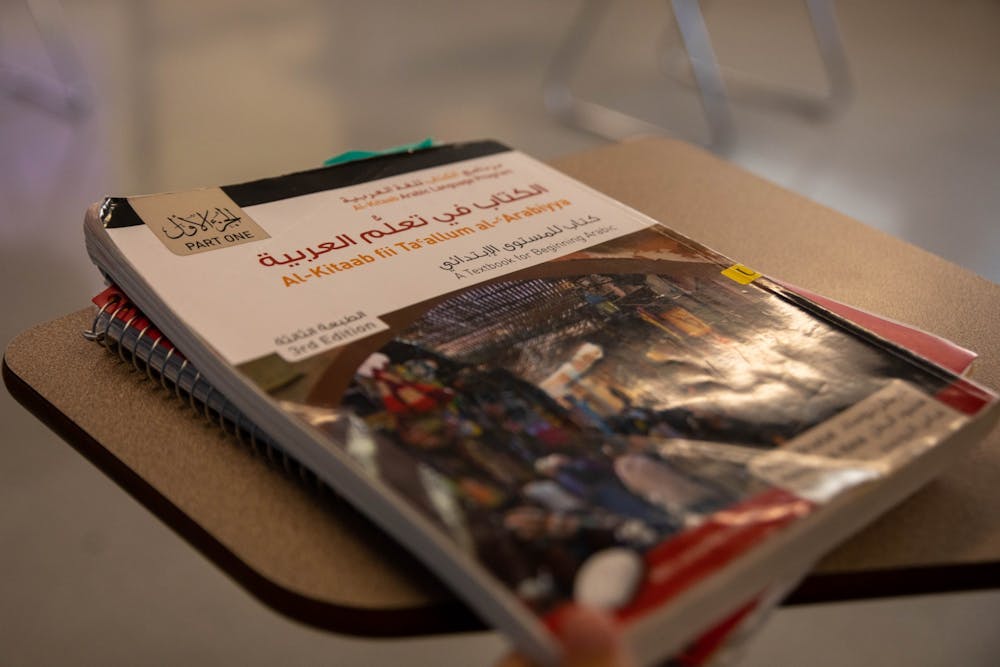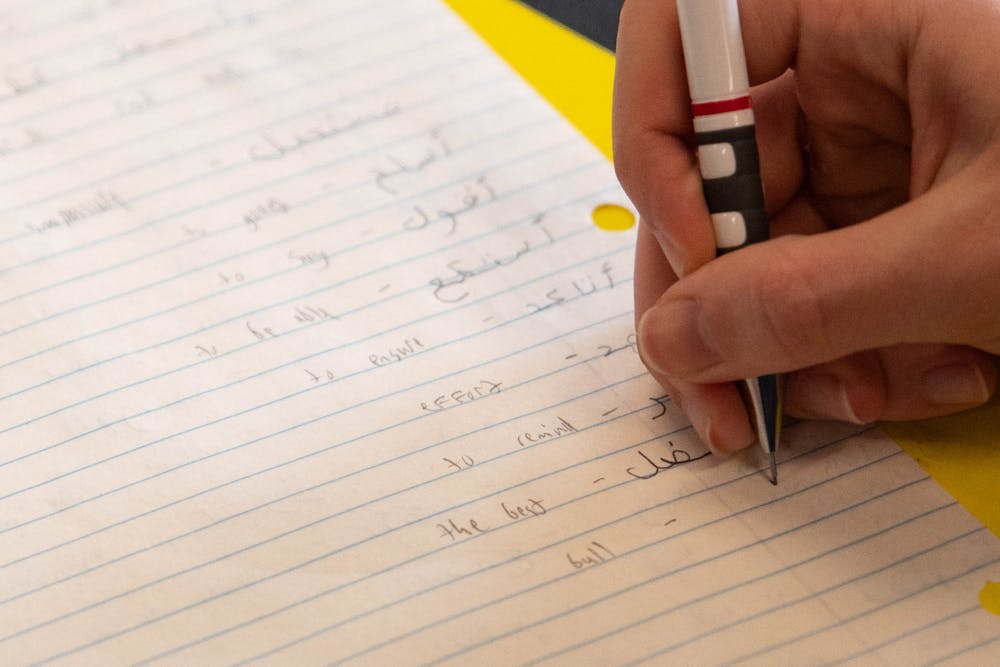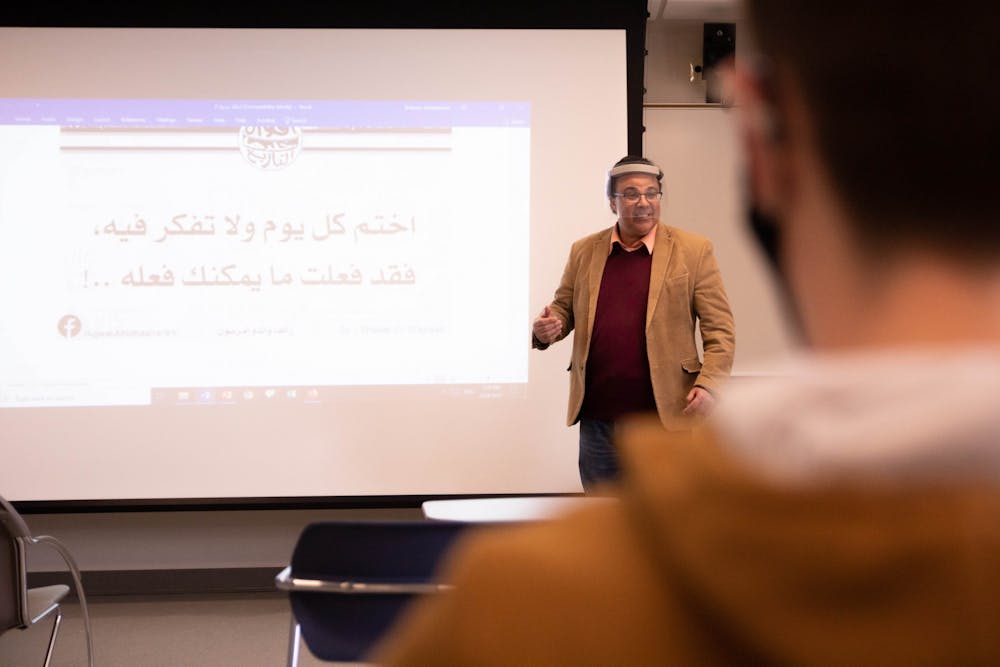Learn some Arabic phrases and characters
MarHaba: Hello
Ahlan: Hello
Tasharfna: Nice to meet you
Shukran: Thank you
UHibuk: I love you
Ana jamiil: I am beautiful
Source: Professor Abdelaadim Bidaoui, Ball State Department of Modern Languages and Classics
Abdelaadim Bidaoui, assistant professor of Arabic and French, may only have five students enrolled in Ball State’s newly introduced Arabic minor, but that hasn’t stopped him from looking to the future of the program.
In January 2021, Bidaoui and the Department of Modern Languages and Classics revamped and re-launched the Arabic minor after discontinuing their previous attempt at the program that started in 2017. Now, after changing the structure and focus of the program, Bidaoui believes the program is ready for new students.
“I’m the only faculty with expertise in Arabic, so it was difficult to cover all the classes involved in the minor,” he said. “That’s why I thought of a creative way to offer an interdisciplinary minor where I could get help from other faculty.”
Instead of focusing on educating students strictly about the Arabic language, Bidaoui said, the goal changed to offer a more holistic approach to the minor, focusing on the linguistic, cultural and historical aspects of Arabic culture. Bidaoui said this approach, which integrates classes and experiences from the department of philosophy and religious studies on top of two years of Arabic language classes, aims to teach students about the identity of the Arab world.
“When we talk about language, language comes along with culture,” he said. “So, you need to learn the language, but, also, you need to know the history, the culture [and] religion of the Arabic-speaking countries. It goes without saying that religion, mainly Islam, has an impact in shaping how the Arabs perceive themselves.”
Exposure to these perspectives, Bidaoui said, can help students unlearn the prejudices and stereotypes against Arabic culture that can be prevalent in non-Arabic countries.
“It’s not only the university [that] needs this diversity, but our country [too],” he said.

An Arabic language textbook sits on a desk March 24, 2021, in the Applied Technology building. The new version of the Arabic minor has more of a focus on the cultural and historical aspects of the field of study, though language is still a core component. Jaden Whiteman, DN
Molly Trivett, sophomore legal studies and pre-law major, decided to pursue Arabic to help her get her dream job: working with the Federal Bureau of Investigation in counterterrorism.
“I thought that Arabic would be super fun to take, and then I fell in love with the class [and] the professor,” Trivett said. “I decided to continue on and hope to be fluent eventually.”
Trivett is currently in her fourth semester at Ball State, which is the last semester she can enroll in the new program. She said she has been waiting for an Arabic minor since her first semester.
To graduate with an Arabic minor, students need to take four basic language classes and two culture classes, Trivett said.
“I think it would be really beneficial if we opened it up to be a major and have people learn more about the culture,” Trivett said. “I also think it would help a lot with [decreasing] xenophobia.”
Students interested in Arabic have the opportunity to go on a study abroad trip to Morocco with Bidaoui. Trivett said Bidaoui takes the trip every summer, and attending fulfills an elective credit for the Arabic minor.
“I would encourage everyone to take Arabic because I think it’s really eye-opening,” Trivett said. “You’re not just learning a language — you’re learning an entire culture.”
Carsten Beyer, a political science graduate student, studied some Arabic during his undergraduate years at Indiana University Kokomo, but wasn’t able to make it his main course of study.
“I picked up a little bit of the script and a little bit of some words and phrases to understand what these people were saying,” Beyer said. “My main focus and interest was a course on the Middle East and radical Islamic groups.”
Beyer said Bidaoui recognized the love his students had for Arabic language and culture and decided to take the steps to make the program into a minor.
“He saw our love for the language,” Beyer said. “He did some work behind the scenes insofar as making a robust course catalog.”

Sophomore political science major Will Strobel writes down the Arabic word for "bull" March 24, 2021, in the Applied Technology building. The Arabic minor was restarted by Ball State in January 2021 after a previous 2017 attempt was discontinued. Jaden Whiteman, DN
Trent McKenzie, sophomore political science and communication studies major, began taking Arabic because of his political science major.
“Starting the Arabic minor was really just starting the language itself,” McKenzie said. “Starting with Arabic 101 and learning to really enjoy the language, the culture, the history surrounding the Arabic language [led to] me wanting to pursue the Arabic minor.”
McKenzie said the process of getting the Arabic minor approved has taken a long time, and he would like to see more students become involved with the Arabic language.
“If you’re already pursuing the Arabic language, it’s not really a big stretch to go and just finish the minor,” McKenzie said. “I love the language, but I don’t mind taking a few more classes to officially have an Arabic minor.”
Bidaoui said he wants to see the program grow in size and scope in both its enrollment and the topics it can cover in the coming years. He hopes new students will join the program and will change their preconceptions of the Arab world when they have the opportunity to appreciate Arabic contributions to the world.
“As we all know,” he said, “most people perceive the East in one particular way that may not do justice to the region.”
Contact John Lynch with comments at jplynch@bsu.edu or on Twitter @WritesLynch. Contact Mackenzie Rupp with comments at msrupp@bsu.edu or on Twitter at @kenzieer18.





